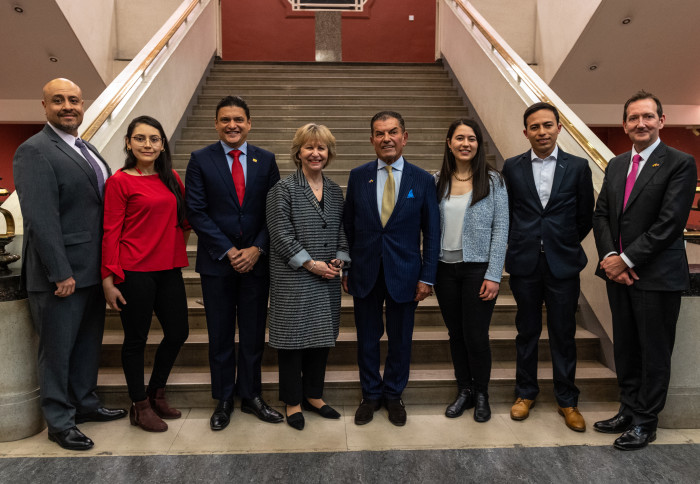Imperial launches science scholarships for Colombian students

The Colombian Ambassador Alvaro Gomez Jaramillo and Science Minister Tito Jose Crissien met Imperial's Colombian students
Imperial has launched new science scholarships for students from Colombia.
The scholarships, which are in partnership with Colombian non-profit foundation Colfuturo, will give tuition discounts to eight Master’s scholars per year for 3 years, starting in 2022-23.
Colfuturo will also offer each successful student up to $50,000 in the form of a scholarship-loan to help finance tuition fees and living expenses.
"We look forward to working together on this collaboration and supporting the next generation of Colombian scientists to thrive in their careers." Professor Maggie Dallman Vice President (International)
The College current has 17 Colfuturo-funded students for the 2021-22 academic year in Master’s programmes across a range of subjects such as chemical engineering, aeronautics, public health and business.
The new scholarships were launched at a Colombian science event at the Natural History Museum. The Colombian Ambassador to the UK, Alvaro Gomez Jaramillo, and the Colombian Science Minister, Tito Jose Crissien, met with some of Imperial's Colombian students to discuss their experience at the College.
Speaking at the event, Vice President (International) Professor Maggie Dallman said: "Supporting student diversity, and enabling talented students from across the world to come to the College is a very important priority for us, and so to be able to offer these eight scholarships for Colombian Master’s students is a really exciting new partnership.
"We look forward to working together on this collaboration and supporting the next generation of Colombian scientists to thrive in their careers."
Colombian Master's students

Jennyfer Ruiz Sánchez, MSC. Ecology, evolution and conservation.
Jennyfer, from Colombia, said: “I started to research information about Imperial and realised that it is one of the top universities in the world.
"The ecology related programs are also excellent. I just want to use this Master’s as a tool to help in tropical forest conservation and gain experience working in Colombia, where we have really bad environmental issues.
“Imperial have multiple approaches to ecological problems. The coding part could be really difficult but it is avant-garde and eventually would be really helpful if you want to work in any ecological field.”
Article text (excluding photos or graphics) © Imperial College London.
Photos and graphics subject to third party copyright used with permission or © Imperial College London.
Reporter
Stephen Johns
Communications Division